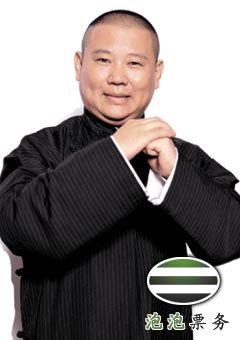In the 2008 Guo Degang Mid-Autumn crosstalk evening, Master Guo has a new work.
2008 Guo Degang Mid-Autumn Festival Crossover Comedy Show - Detailed Introduction
Someone once commented that the most brilliant part of Guo Degang's crossover comedy is his ability to constantly deliver a large number of well-timed jokes within just a few hours. His performances also feature other solid traditional art forms such as storytelling, drum ballads, Peking Opera, Pingju Opera, and Hebei Bangzi; the content is always fresh and keeps up with the trends of the times. Guo Degang himself is both literary and martial, capable of performing crossovers and writing scripts, skilled at infusing vitality into his own comedies. The small theater format can easily engage the audience, creating lively interactions and bringing good word-of-mouth. His crossover comedy shows often trigger unconscious狂欢s among the crowd, akin to a gala evening.
Guo Degang Mid-Autumn Festival Crossover Comedy Show Time: September 13, 2008, 7:30 PM
Guo Degang Mid-Autumn Festival Crossover Comedy Show Location: Shanghai International Gymnastics Center
Guo Degang Mid-Autumn Festival Crossover Comedy Show Ticket Prices: 680, 580, 480, 280, 180, 100 RMB
Guo Degang was born in Tianjin in 1973. At the age of eight, he entered the arts circle, first studying storytelling under the tutelage of the veteran storyteller Gao Qinghai, then later learning crossovers from the renowned crossover comedian Chang Baofeng. During this time, he also studied various theatrical forms such as Peking Opera, Pingju Opera, and Hebei Bangzi, moving through the world of opera, specializing in wen chou (civil clown) roles and tong chui (copper hammer). By borrowing from various artistic forms, he formed his own style. In 2004, he apprenticed under the famous crossover artist Hou Yaowen.
Guo Degang currently resides in Beijing, where he has unearthed and performed some rarely seen traditional crossovers through the Beijing Deyun Crossover Comedy Troupe, presenting over six hundred segments, deeply loved by crossover fans in Tianjin and Beijing.
However, the grassroots Guo Degang, who stands at the center of controversy, became too popular too quickly, overshadowing others and inevitably neglecting the feelings of his peers. This soon led to much opposition, with many colleagues and collaborators stepping forward to criticize Guo Degang for having "serious issues with artistic ethics," sparking what seemed like an anti-Guo movement.
On one side there is adoration, on the other side there is criticism, each with their own reasons, creating quite a spectacle. Perhaps who wins or loses is not important; what matters most is whether crossovers can develop and whether artists bring good works to the people.
